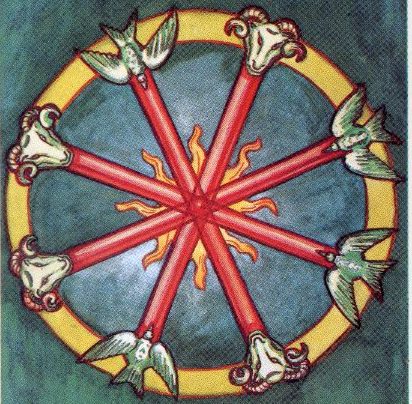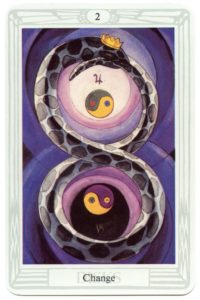Thelema is a religion founded in 1904 by the English poet and mystic, Aleister Crowley (1875-1947), who is regarded as its prophet. Those who follow the path of Thelema are called Thelemites.1
Thelema (Θελημα) is a Greek word for will, and the essential teaching of Thelema is “Do what thou wilt shall be the whole of the Law.” Of this teaching Crowley said,
“Do what thou wilt…” is to bid Stars to shine, Vines to bear grapes, Water to seek its level; man is the only being in Nature that has striven to set himself at odds with himself.2
From this we may infer that the essential teaching of Thelema is that each person ought to live in accordance with nature as expressed through their individual being. In this respect, Thelema is similar to Stoicism, Buddhism, or other religions which teach us to live according to the laws set by nature rather than God or human beings. Yet the Thelemic view of the universe according to Crowley differs in fundamental respects from what is taught in other religions and philosophies.
“Had! The manifestation of Nuit. The unveiling of the company of heaven.” (AL I.1-2)3
The foundation of Thelema is Liber AL vel Legis, which is Latin for Book AL or the Book of the Law.4
The Book of the Law was dictated to Aleister Crowley in Cairo, Egypt in 1904 by a spiritual being that called itself Aiwass. This book declared a new age for humanity, the Aeon of the Child, and proclaimed a new law for the conduct of all human beings: Do what thou wilt.
The universe described by the Book of the Law consists in two irreducible entities or concepts: the totality of possibilities of all kind, and any point of view on those possibilities. The first is symbolized by the Egyptian sky goddess, Nuit, and the second is represented by the Egyptian sun god, Hadit.5
“Every man and every woman is a star.” (AL I.3)
Experience arises when Hadit (the self of each individual) unites with some possibility inherent in Nuit (the spatiotemporal universe). Each person is “an aggregate of such experiences, constantly changing with each fresh event” or a star.6
Crowley describes each individual star or consciousness as an absolute monad: simple, utterly indestructible, as well as omnipotent, omniscient, and omnipresent. These are characteristics usually attributed to God, and indeed, Crowley taught that each star was the center and origin of its own universe.7
“For I am divided for love’s sake, for the chance of union.” (AL I.29)
Throughout our lives, and even throughout the course of a day, many events occur that imply oppositions or dualities. We experience pleasant versus unpleasant sensations, sorrowful versus happy occurrences, success versus failure in our endeavors, cruelty versus kindness in our actions, self versus world, self versus others, and many more. But the universe appears to us this way, because it is only by means of opposition that our Hadit or god-self can have experience and learn about itself. While each of us encounters constant opposition from the world and others, this opposition is both necessary and willed.8 From this, the supreme teaching of Thelema follows:9
“Do what thou wilt shall be the whole of the Law.” (AL I.40)
Crowley speaks of the will in two basic senses. On the one hand, each person has to discover for themselves what their purpose in life is. This could involve discovering which particular career or form of service suits your personality best and dedicating yourself wholeheartedly to it.10 It also means being free to express one’s individuality artistically and sexually, to work and to play as suits one’s own nature, and even to move across the face of the earth without interference from others.11 Crowley calls this the finite will or your will in the context of this life.12
Then there is your will in eternity or your infinite will, which is the will of Hadit—your true self—to explore every possibility available to itself, even across many incarnations. Crowley calls this the Great Work or the union of Hadit with Nuit.13
These need not be seen as two separate wills but rather two perspectives on the same will: the will seen from the perspective of this incarnation, where each moment presents us with the choice between doing our will versus not doing it, and the perspective of eternity, wherein every occurrence accords with our will, because every moment is necessary and perfect in and of itself.14
“Love is the law, love under will.” (AL I.57)
Every event whatsoever is an act of love, as each consists in the uniting of Hadit or the divine self of each individual with a possibility inherent in Nuit.15 While it is technically impossible not to do your will (seen from the infinite perspective), it is possible (from the finite perspective) to desire not to do your will, and from this arises suffering.16 It is therefore up to each of us to discover for ourselves what our true will is and to accept and desire to fulfill it rather than thwart it. Crowley calls the methods for achieving this magick.17
“Remember all ye that existence is pure joy; that all the sorrows are but as shadows; they pass & are done; but there is that which remains.” (AL II.9)
Since all events are acts of love under will, it follows that, at its very foundation, existence is joyful. Sorrow arises when we think of any two things as opposed to one another. Some one event pleases us so we call it “good,” and another is unpleasant so we call it “bad”. But they are all fundamentally “good,” because they are all the effect of Hadit loving Nuit, which itself is the natural result of each of us doing our will.18 This love of Hadit for Nuit eventually culminates in the union between the two which occurs at death, and therefore “death is the crown of all.”19
While there is more to Thelema than what is presented here, the rest are largely implications or practices intended to achieve these ideals. For further information, the reader is encouraged to explore the resources footnoted in this section.
1 https://oto-usa.org/thelema/
2 “Notes for an Astral Atlas,” in Magick in Theory and Practice (MITAP), Appendix III.
3 Chapters and verses of the Book of the Law are notated AL Chapter.Verse
4 AL is a Hebrew name for God.
5 Introduction to The Book of the Law (Intro).
6 Intro.
7 Intro and New Comment (NC) on AL I.3.
8 NC to AL I.29.
9 NC on AL I.3
10 MITAP (Introduction) and Liber CL (Section I).
11 Liber LXXVII.
12 Liber CL (Section I).
13 Ibid.
14 Intro.
15 Ibid.
16 NC on AL 1.51 and Liber CL.
17 Intro.
18 Djeridensis Comment on AL II.9.
19 NC on AL II.72.
References
- Crowley, Aleister. The Djeridensis Comment
- Crowley, Aleister. Liber CL
- Crowley, Aleister. Magick in Theory and Practice
- Crowley, Aleister. The New and Old Commentaries to Liber AL vel Legis, The Book of the Law
- Liber AL vel Legis sub figura CCXX with Introduction by Aleister Crowley
- United States Grand Lodge Ordo Templi Orientis





 Hadit’s raison d’être is to explore itself through the artifice of duality. According to the commentaries, this is why the nature of existence is pure joy, and why the character of all change is love. The cardinal sin is to take the presentation of duality as a restriction of my will rather than a vehicle for the exploration of it. For example, we prefer this change and call it good, we dislike that change and call it bad, or we find that change too slow so we call it boring.
Hadit’s raison d’être is to explore itself through the artifice of duality. According to the commentaries, this is why the nature of existence is pure joy, and why the character of all change is love. The cardinal sin is to take the presentation of duality as a restriction of my will rather than a vehicle for the exploration of it. For example, we prefer this change and call it good, we dislike that change and call it bad, or we find that change too slow so we call it boring.
 It’s in the nature of the human mind to always be in the process of bringing about some new state of affairs. There is a general, indeterminate desire to live, to be, to become, that exists outside of conscious choice. You can call it “conatus” as Spinoza did, “fabrication” as the Buddha did, or “true will” as Crowley did, but I think they’re pointing at the same basic phenomenon. This is why, even though so many people have noticed that life is miserable and full of suffering, suicide is (relatively) rare. Even a person who kills themselves out of despair is operating under the illusion that doing so will bring about a state of affairs better than the one they currently occupy.
It’s in the nature of the human mind to always be in the process of bringing about some new state of affairs. There is a general, indeterminate desire to live, to be, to become, that exists outside of conscious choice. You can call it “conatus” as Spinoza did, “fabrication” as the Buddha did, or “true will” as Crowley did, but I think they’re pointing at the same basic phenomenon. This is why, even though so many people have noticed that life is miserable and full of suffering, suicide is (relatively) rare. Even a person who kills themselves out of despair is operating under the illusion that doing so will bring about a state of affairs better than the one they currently occupy.